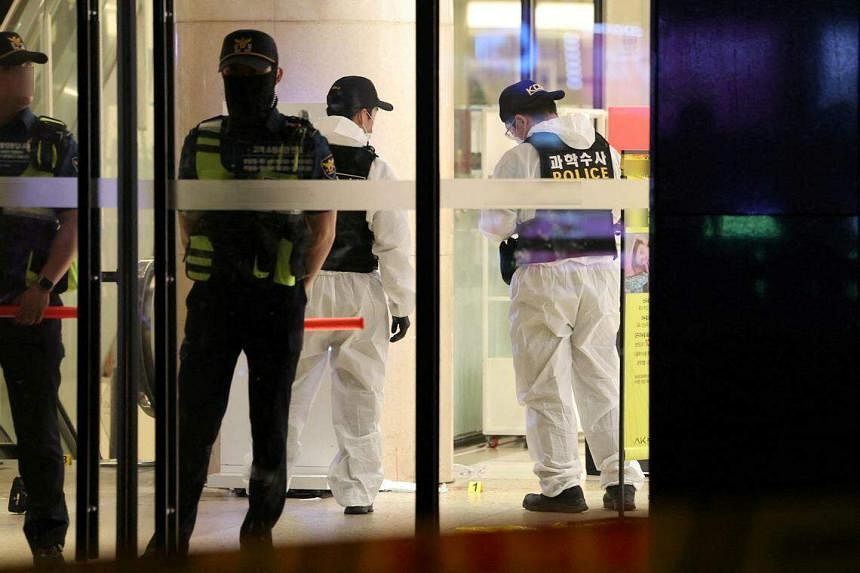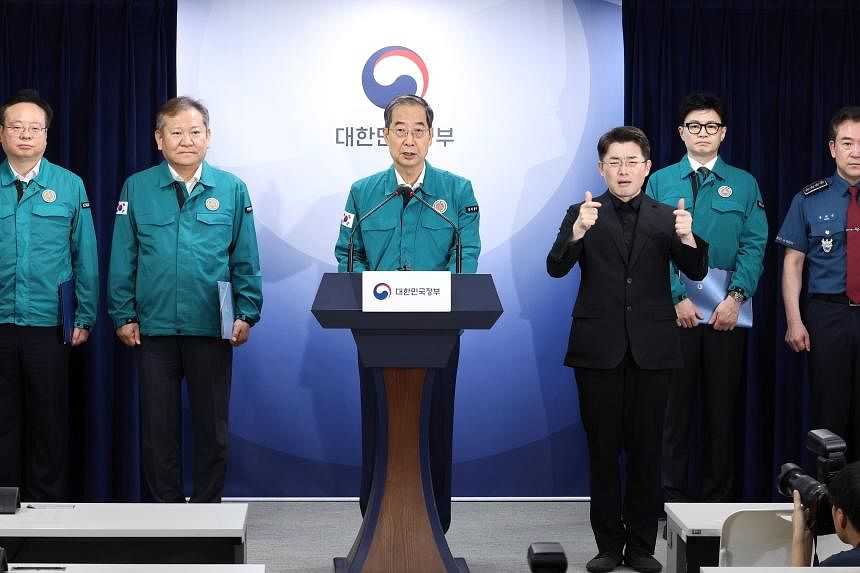SEOUL - South Korea announced on Wednesday that it seeks to revive the recently abolished conscripted police system to strengthen the state’s crime prevention capabilities.
According to the announcement – which came amid the recent surge of crimes seemingly targeting people at random – the government plans to add up to 8,000 conscripted police officers within nine months.
To enhance the police’s ability to prevent crimes, the government will reintroduce the conscripted police system, Prime Minister Han Duck-soo said in an announcement at the Government Complex Seoul on Wednesday.
Mr Han said the measure is for “ensuring safety and protecting the lives of ordinary citizens from senseless crimes”.
The conscripted police system – in which draftees serve as an alternative to regular compulsory military service – was phased out under a policy direction announced in 2017 by former president Moon Jae-in, due to the shrinking population and the shortage of military-aged men.
During his election campaign, Mr Moon pledged to recruit more regular police officers instead, as part of a wider drive to increase public sector jobs. After he was elected in 2017, a policy plan included hiring 20,000 additional police officers between 2017 and 2022.
Before the phase-out, South Korea had some 25,000 auxiliary conscripted policemen. Recruitment ceased in December 2021 and the last conscripted policeman left in May 2023.
The conscripted police system was founded in 1967, under the Park Chung-hee authoritarian military regime, which ruled South Korea for nearly two decades. Since democratisation in the 1980s, the auxiliary police have been frequently dispatched to protest scenes.
Under the preliminary plan of President Yoon Suk-yeol’s administration, the national police will conscript over 3,500 auxiliary conscripted policemen for deployment in emergencies, and over 4,000 conscripted policemen to patrol vulnerable locations. This was according to the National Police Agency’s commissioner general Yoon Hee-keun, who attended Wednesday’s briefing.
The move will come alongside the reorganisation of the police force to put the policing of neighbourhoods as the top priority over others like investigations, traffic control, cybercrime deterrence, foreign affairs and more.
This reorganisation will include the installation of more closed-circuit television (CCTV) cameras and emergency bells in crime-prone areas, according to Mr Han.
South Korea’s national police currently has some 140,000 police officers nationwide, but among them no more than 30,000 are available for deployment on the streets for patrolling or other public safety roles such as crowd control, according to the police commissioner general.
The reorganisation will make “more police officers visible”, he said.
Mr Han said the government is looking to endow the court with the authority to send people with diagnosed mental illnesses who are deemed to be a potential threat to others into compulsory custody in psychiatric wards.
But a diagnosis often does not come until after a crime has been committed, as there is an incentive to claim mental illness as a mitigating factor in sentencing.
The attorneys of Cho Seon, 33, who has been charged over a stabbing rampage that killed one and injured three others near Sillim subway station in July, brought up this extenuating factor as the court trial began on Wednesday. They argued that Cho suffered from a delusional disorder and mistook those he stabbed for stalkers.

Choi Won-jong, 22, who killed one person and injured 13 others by driving a car through a shopping mall in southern Gyeonggi province and going on a stabbing spree early in August, appears to have adopted a similar ploy. He told reporters he was being pursued and bullied by a group of stalkers and that he committed the crime to “make the existence of the stalkers known to the world”.
The government is “capable of discerning the types of mental illnesses that are likely to trigger violent crimes from the types that are not”, Mr Han told reporters.
Health Minister Cho Kyoo-hong said that giving the court authority to order the detention of those suffering from mental illness would “boost efficiency” in the detention process.
During the speech, Mr Han also reiterated his pledge to introduce the life sentence without the possibility of parole. He also hinted at expanding fiscal support to randomly targeted victims in “motiveless” crimes.
He stressed that now is the time to come up with fundamental measures to reduce crime by addressing “structural problems”.
“Recent senseless crimes... appear to have been motivated by a number of factors including the social disadvantage that suspects have experienced, as well as the rise of social media that boosts the sense of deprivation of the marginalised,” said Mr Han.
“None of them serves as justifications for their hideous crimes.”
In a separate announcement, the Seoul metropolitan government unveiled plans to strengthen the surveillance infrastructure on trails for hiking and trekking after Mayor Oh Se-hoon met the heads of 25 district ward offices on Wednesday.
The municipal government also pledged to set up surveillance cameras in all Seoul subway cars by 2024. CCTV cameras will gradually be replaced with ones capable of automatically detecting violence and abnormalities, and alerting the nearest police and fire stations.
Additionally, all 25 districts in Seoul will operate accompanied walk home services for women out at night in their neighbourhood. Seoul did not elaborate on when this service, which is currently available in 15 districts in Seoul, will be expanded. THE KOREA HERALD/ASIA NEWS NETWORK

